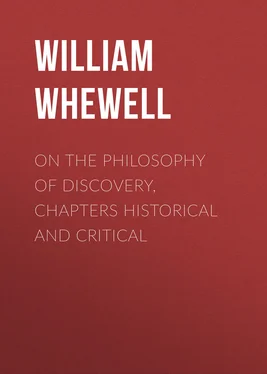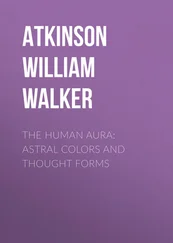William Whewell - On the Philosophy of Discovery, Chapters Historical and Critical
Здесь есть возможность читать онлайн «William Whewell - On the Philosophy of Discovery, Chapters Historical and Critical» — ознакомительный отрывок электронной книги совершенно бесплатно, а после прочтения отрывка купить полную версию. В некоторых случаях можно слушать аудио, скачать через торрент в формате fb2 и присутствует краткое содержание. Жанр: foreign_prose, foreign_religion, Философия, foreign_psychology, foreign_antique, на английском языке. Описание произведения, (предисловие) а так же отзывы посетителей доступны на портале библиотеки ЛибКат.
- Название:On the Philosophy of Discovery, Chapters Historical and Critical
- Автор:
- Жанр:
- Год:неизвестен
- ISBN:нет данных
- Рейтинг книги:5 / 5. Голосов: 1
-
Избранное:Добавить в избранное
- Отзывы:
-
Ваша оценка:
- 100
- 1
- 2
- 3
- 4
- 5
On the Philosophy of Discovery, Chapters Historical and Critical: краткое содержание, описание и аннотация
Предлагаем к чтению аннотацию, описание, краткое содержание или предисловие (зависит от того, что написал сам автор книги «On the Philosophy of Discovery, Chapters Historical and Critical»). Если вы не нашли необходимую информацию о книге — напишите в комментариях, мы постараемся отыскать её.
On the Philosophy of Discovery, Chapters Historical and Critical — читать онлайн ознакомительный отрывок
Ниже представлен текст книги, разбитый по страницам. Система сохранения места последней прочитанной страницы, позволяет с удобством читать онлайн бесплатно книгу «On the Philosophy of Discovery, Chapters Historical and Critical», без необходимости каждый раз заново искать на чём Вы остановились. Поставьте закладку, и сможете в любой момент перейти на страницу, на которой закончили чтение.
Интервал:
Закладка:
"In the study of the sciences which depend on mathematics, those who do not consult nature but authors, are not the children of nature, they are only her grandchildren. She is the true teacher of men of genius. But see the absurdity of men! They turn up their noses at a man who prefers to learn from nature herself rather than from authors who are only her clerks."
In another place, in reference to a particular case, he says, "Nature begins from the Reason and ends in Experience; but for all that, we must take the opposite course; begin from the Experiment and try to discover the Reason."
Leonardo was born forty-six years before Telesius; yet we have here an estimate of the value of experience far more just and substantial than the Calabrian school ever reached. The expressions contained in the above extracts, are well worthy our notice;—that experience is never deceived;—that we must vary our experiments, and draw from them general rules;—that nature is the original source of knowledge, and books only a derivative substitute;—with a lively image of the sons and grandsons of nature. Some of these assertions have been deemed, and not without reason, very similar to those made by Bacon a century later. Yet it is probable that the import of such expressions, in Leonardo's mind, was less clear and definite than that which they acquired by the progress of sound philosophy. When he says that theory is the general and experiments the soldiers, he probably meant that theory directs men what experiments to make; and had not in his mind the notion of a theoretical Idea ordering and brigading the Facts. When he says that Experience is the interpreter of Nature, we may recollect, that in a more correct use of this image, Experience and Nature are the writing, and the Intellect of man the interpreter. We may add, that the clear apprehension of the importance of Experience led, in this as in other cases, to an unjust depreciation of the value of what science owed to books. Leonardo would have made little progress, if he had attempted to master a complex science, astronomy for instance, by means of observation alone, without the aid of books.
But in spite of such criticism, Leonardo's maxims show extraordinary sagacity and insight; and they appear to us the more remarkable, when we see how rare such views are for a century after his time.
3. Copernicus. —For we by no means find, even in those practical discoverers to whom, in reality, the revolution in science, and consequently in the philosophy of science, was due, this prompt and vigorous recognition of the supreme authority of observation as a ground of belief; this bold estimate of the probable worthlessness of traditional knowledge; and this plain assertion of the reality of theory founded upon experience. Among such discoverers, Copernicus must ever hold a most distinguished place. The heliocentric theory of the universe, established by him with vast labour and deep knowledge, was, for the succeeding century, the field of discipline and exertion of all the most active speculative minds. Men, during that time, proved their freedom of thought, their hopeful spirit, and their comprehensive view, by adopting, inculcating, and following out the philosophy which this theory suggested. But in the first promulgation of the theory, in the works of Copernicus himself, we find a far more cautious and reserved temper. He does not, indeed, give up the reality of his theory, but he expresses himself so as to avoid shocking those who might (as some afterwards did) think it safe to speak of it as an hypothesis rather than a truth. In his preface addressed to the Pope 130 130 Paul III. in 1543.
, after speaking of the difficulties in the old and received doctrines, by which he was led to his own theory, he says, "Hence I began to think of the mobility of the earth; and although the opinion seemed absurd, yet because I knew that to others before me this liberty had been conceded, of imagining any kinds of circles in order to explain the phenomena of the stars, I thought it would also be readily granted me, that I might try whether, by supposing the earth to be in motion, I might not arrive at a better explanation than theirs, of the revolutions of the celestial orbs." Nor does he anywhere assert that the seeming absurdity had become a certain truth, or betray any feeling of triumph over the mistaken belief of his predecessors. And, as I have elsewhere shown, his disciples 131 131 Hist. Ind. Sc. b. v. c. ii.
indignantly and justly defended him from the charge of disrespect towards Ptolemy and other ancient astronomers. Yet Copernicus is far from compromising the value or evidence of the great truths which he introduced to general acceptance; and from sinking in his exposition of his discoveries below the temper which had led to them. His quotation from Ptolemy, that "He who is to follow philosophy must be a freeman in mind," is a grand and noble maxim, which it well became him to utter.
4. Fabricius. —In another of the great discoverers of this period, though employed on a very different subject, we discern much of the same temper. Fabricius of Acquapendente 132 132 Born 1537, died 1619.
, the tutor and forerunner of our Harvey, and one of that illustrious series of Paduan professors who were the fathers of anatomy 133 133 Hist. Ind. Sc. b. xvii. c. ii. sect. 1.
, exhibits something of the same respect for antiquity, in the midst of his original speculations. Thus in a dissertation 134 134 Fabricius, De Motu Locali , p. 182.
On the Action of the Joints , he quotes Aristotle's Mechanical Problems to prove that in all animal motion there must be some quiescent fulcrum; and finds merit even in Aristotle's ignorance. "Aristotle," he says 135 135 p. 199.
, "did not know that motion was produced by the muscle; and after staggering about from one supposition to another, at last is compelled by the facts themselves to recur to an innate spirit, which, he conceives, is contrasted, and which pulls and pushes. And here we cannot help admiring the genius of Aristotle, who, though ignorant of the muscle, invents something which produces nearly the same effect as the muscle, namely, contraction and pulling." He then, with great acuteness, points out the distinction between Aristotle's opinions, thus favourably interpreted, and those of Galen. In all this, we see something of the wish to find all truths in the writings of the ancients, but nothing which materially interferes with freedom of inquiry. The anatomists have in all ages and countries been practically employed in seeking knowledge from observation. Facts have ever been to them a subject of careful and profitable study; while the ideas which enter into the wider truths of the science, are, as we have seen, even still involved in obscurity, doubt, and contest.
5. Maurolycus. —Francis Maurolycus of Messana, whose mathematical works were published in 1575, was one of the great improvers of the science of optics in his time. In his Preface to his Treatise on the Spheres, he speaks of previous writers on the same subject; and observes that as they have not superseded one another, they have not rendered it unfit for any one to treat the subject afresh. "Yet," he says, "it is impossible to amend the errors of all who have preceded us. This would be a task too hard for Atlas, although he supports the heavens. Even Copernicus is tolerated, who makes the sun to be fixed, and the earth to move round it in a circle, and who is more worthy of a whip or a scourge than of a refutation." The mathematicians and astronomers of that time were not the persons most sensible of the progress of physical knowledge; for the basis of their science, and a great part of its substance, were contained in the writings of the ancients; and till the time of Kepler, Ptolemy's work was, very justly, looked upon as including all that was essential in the science.
Читать дальшеИнтервал:
Закладка:
Похожие книги на «On the Philosophy of Discovery, Chapters Historical and Critical»
Представляем Вашему вниманию похожие книги на «On the Philosophy of Discovery, Chapters Historical and Critical» списком для выбора. Мы отобрали схожую по названию и смыслу литературу в надежде предоставить читателям больше вариантов отыскать новые, интересные, ещё непрочитанные произведения.
Обсуждение, отзывы о книге «On the Philosophy of Discovery, Chapters Historical and Critical» и просто собственные мнения читателей. Оставьте ваши комментарии, напишите, что Вы думаете о произведении, его смысле или главных героях. Укажите что конкретно понравилось, а что нет, и почему Вы так считаете.












